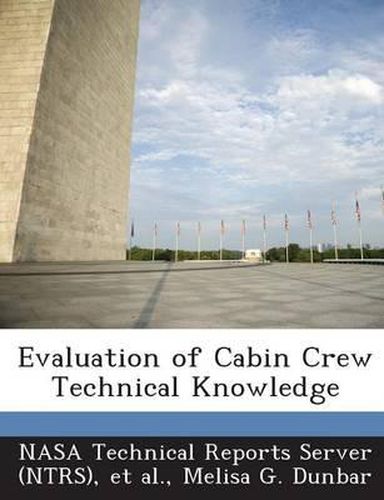Readings Newsletter
Become a Readings Member to make your shopping experience even easier.
Sign in or sign up for free!
You’re not far away from qualifying for FREE standard shipping within Australia
You’ve qualified for FREE standard shipping within Australia
The cart is loading…






Accident and incident reports have indicated that flight attendants have numerous opportunities to provide the flight-deck crew with operational information that may prevent or essen the severity of a potential problem. Additionally, as carrier fleets transition from three person to two person flight-deck crews, the reliance upon the cabin crew for the transfer of this information may increase further. Recent research (Chute & Wiener, 1996) indicates that light attendants do not feel confident in their ability to describe mechanical parts or malfunctions of the aircraft, and the lack of flight attendant technical training has been referenced in a number of recent reports (National Transportation Safety Board, 1992; Transportation Safety Board of Canada, 1995; Chute & Wiener, 1996). The present study explored both flight attendant technical knowledge and flight attendant and dot expectations of flight attendant technical knowledge. To assess the technical knowledge if cabin crewmembers, 177 current flight attendants from two U.S. carriers voluntarily: ompleted a 13-item technical quiz. To investigate expectations of flight attendant technical knowledge, 181 pilots and a second sample of 96 flight attendants, from the same two airlines, completed surveys designed to capture each group’s expectations of operational knowledge required of flight attendants. Analyses revealed several discrepancies between the present level of flight attendants.
$9.00 standard shipping within Australia
FREE standard shipping within Australia for orders over $100.00
Express & International shipping calculated at checkout
Accident and incident reports have indicated that flight attendants have numerous opportunities to provide the flight-deck crew with operational information that may prevent or essen the severity of a potential problem. Additionally, as carrier fleets transition from three person to two person flight-deck crews, the reliance upon the cabin crew for the transfer of this information may increase further. Recent research (Chute & Wiener, 1996) indicates that light attendants do not feel confident in their ability to describe mechanical parts or malfunctions of the aircraft, and the lack of flight attendant technical training has been referenced in a number of recent reports (National Transportation Safety Board, 1992; Transportation Safety Board of Canada, 1995; Chute & Wiener, 1996). The present study explored both flight attendant technical knowledge and flight attendant and dot expectations of flight attendant technical knowledge. To assess the technical knowledge if cabin crewmembers, 177 current flight attendants from two U.S. carriers voluntarily: ompleted a 13-item technical quiz. To investigate expectations of flight attendant technical knowledge, 181 pilots and a second sample of 96 flight attendants, from the same two airlines, completed surveys designed to capture each group’s expectations of operational knowledge required of flight attendants. Analyses revealed several discrepancies between the present level of flight attendants.